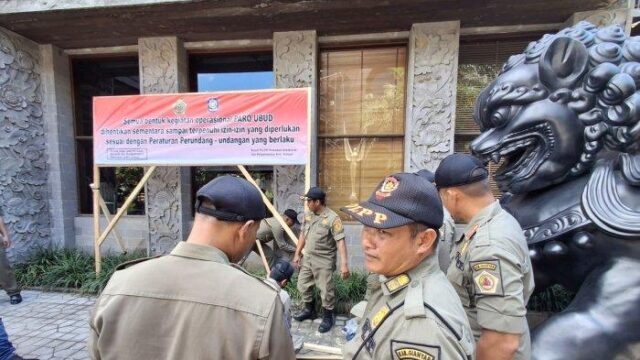The Tide Is Turning
For decades, foreign investors in Indonesia have treated the nation’s laws as mere suggestions, exploiting loopholes and assuming their wealth would shield them from consequences. Bali, in particular, has become a battleground where cultural heritage and environmental sanctity clash with foreign entitlement. But the tide is turning.
The recent closure of PARQ Ubud, a glaring example of arrogance and disregard, has sent shockwaves through the foreign investment community. Built in blatant violation of green zone regulations, the project’s illegal operations have sparked outrage among Balinese locals. This is not an isolated case. Across the island, communities are rising against unlawful development, and government enforcement is gaining momentum.
This article lays bare the realities of foreign investment in Indonesia: the arrogance, the complicity, and the consequences. It is a call to investors and local stakeholders alike to respect the rules, uphold integrity, and embrace ethical development.
The Arrogance of Foreign Investors
Foreign investors often arrive in Bali with grand visions, pockets full of cash, and an attitude that the rules do not apply to them. For years, these investors have flouted Indonesia’s land use and building regulations, constructing sprawling resorts, villas, and businesses in zones explicitly designated as off-limits.
In November 2024, Bali authorities temporarily closed PARQ Ubud, a prominent residential and commercial complex in Ubud, due to significant permit violations. The Gianyar Regency Government’s Licensing Supervision Technical Team discovered that PARQ Ubud lacked essential business licenses, including the Building Approval (PBG) and Certificate of Function Worthiness (SLF). [The Bali Sun]
The closure followed multiple attempts by local authorities to address these compliance issues. PARQ Ubud was invited to meetings on May 30 and November 1, 2024, to discuss the necessary permits. However, the owners failed to present the required documentation. Consequently, officials installed banners at the complex, announcing the suspension of operations until all permits were obtained.
Additionally, it was reported that PARQ Ubud was constructed on protected rice fields and sustainable food agricultural land, areas designated for preservation. This violation of zoning laws further contributed to the government’s decision to halt all activities at the site.
Key Legal Takeaways:
- Mandatory Permits: Operating without fundamental permits like the PBG and SLF is a serious violation in Indonesia, leading to enforced closures.
- Zoning Compliance: Building on protected or agriculturally designated land without proper authorization breaches zoning regulations and can result in severe penalties.
- Engagement with Authorities: Ignoring official communications and failing to rectify compliance issues can escalate enforcement actions, including operational shutdowns.
The PARQ Ubud scandal epitomises this arrogance. Constructed on green zone land—designated for agricultural use—the sprawling complex ignored zoning laws, environmental safeguards, and community concerns. Despite repeated warnings, its owners continued operations until authorities stepped in, issuing closure orders and fines.
Such incidents are not just legal violations; they are acts of cultural disrespect. By disregarding local laws, these investors send a clear message:
“Our profits matter more than your heritage, your environment, and your community.”
Foreign investor
The shuttering of PARQ Ubud underscores the critical importance of adhering to Indonesia’s statutory requirements for construction and business operations. Ensuring all necessary permits are secured and zoning laws are respected is essential to avoid legal repercussions and maintain operational integrity.
The Role of Local Complicity
But foreign investors are not the only culprits. Many Balinese landowners knowingly sell land in restricted zones, turning a blind eye to the inevitable violations. Driven by short-term financial gains, they compromise the island’s long-term sustainability.
The government has recognized this issue and is actively educating landowners about their rights and responsibilities. Initiatives aim to empower locals to make informed decisions, discouraging them from selling land to developers with dubious intentions. However, greed and desperation still lead many to prioritize immediate profit over preserving Bali’s future.
This complicity undermines efforts to protect Bali’s environment and cultural identity, creating a vicious cycle of illegal development and environmental degradation.
A Case Study: Tabanan’s Community Action
In October 2024, the residents of Wangaya Betan, a traditional village in Desa Mangesta, Kecamatan Penebel, Tabanan, Bali, took a firm stand against the construction of a villa in their area. The community’s opposition was marked by the installation of banners at the construction site, signaling their disapproval. This action was driven by concerns over the villa’s location in a designated green zone and its proximity to sacred sites, including Pura Dalem and Beji Desa Adat Wongaya Betan.
Despite interventions from local authorities, including the Dinas PUPRPKP (Public Works and Spatial Planning), DPMPTSP (Investment and One-Stop Integrated Services), and Satpol PP (Civil Service Police Unit), who had visited the site multiple times to assert that the construction was in a green zone, the developer continued the project. This persistence led the community to escalate their protest by placing banners demanding the cessation of the villa’s construction.
The situation intensified when these banners were vandalised shortly after being erected. Witnesses reported that individuals, possibly acting on behalf of the developer, were responsible for the damage. In response, the village authorities filed a report with the local police to prevent further conflicts.

This grassroots action underscores the growing vigilance and resistance of Balinese communities in safeguarding their environmental and cultural heritage against unauthorised developments. Empowered by greater awareness and government support, locals are increasingly willing to challenge foreign investors who disregard the rules. It also highlights the challenges faced by local authorities in enforcing zoning regulations and the importance of community involvement in upholding these laws.
For foreign investors, this serves as a critical reminder of the necessity to respect local regulations and cultural sensitivities. Engaging in thorough due diligence and maintaining open communication with local communities are essential steps to ensure that development projects are both legally compliant and culturally respectful.
The Tabanan protest serves as a warning: foreign investors can no longer rely on silence or complicity to pursue unethical projects.
TraceWorthy’s Real-Life Example: Integrity Above Profit
At TraceWorthy, we have seen firsthand the damage caused by foreign investors who ignore the rules. One of our former clients, a Russian-owned company, approached us for legal and financial services. During due diligence, we discovered the land they planned to acquire had severe restrictions, including setbacks from a river, ceremonial grounds, and height limits.
Despite our advice, the company proceeded to build in violation of these regulations. They constructed too close to the river, desecrated sacred grounds, and erected structures exceeding height restrictions. We terminated the relationship immediately. TraceWorthy will not tolerate clients who lack integrity or respect for Indonesian law.
This experience underscores the importance of accountability and the role professionals play in guiding ethical investment.
What’s Coming: Compliance in the New Era
With President Prabowo Subianto now in office, Indonesia is poised for stricter enforcement of land use and building regulations. The government is already taking steps to clamp down on violations, empowering local communities and imposing harsher penalties on offenders.
Foreign investors should take note. The days of turning a blind eye to regulations are over. From asset seizures to public blacklisting, the consequences of non-compliance are becoming increasingly severe.
✔ Engage Local Experts: Retain licensed architects, legal advisors, and accountants familiar with Indonesia’s regulatory landscape. Their expertise can help you avoid costly missteps.
✔ Conduct Thorough Due Diligence: Before acquiring land or starting construction, ensure all zoning, environmental, and spatial planning regulations are thoroughly reviewed.
✔ Verify Permits and Approvals: Double-check that all required permits—building permits (PBG), environmental impact assessments, and land use certifications—are obtained and up to date.
✔ Stay Updated on Regulations: Monitor local and national regulatory updates to ensure ongoing compliance, especially as enforcement policies evolve under new leadership.
✔ Prioritize Community Engagement: Build relationships with local stakeholders by hosting forums, respecting cultural norms, and addressing community concerns transparently.
✔ Document Every Step: Maintain detailed records of permits, approvals, and compliance measures for potential audits or legal challenges.
✔ Audit Your Operations Regularly: Schedule periodic compliance audits to identify and rectify potential issues before they escalate.
✔ Respect Cultural and Environmental Boundaries: Avoid constructing on ceremonial grounds, near protected areas, or in zones designated for agriculture or conservation.
✔ Establish an Escalation Plan: Have a clear plan in place to address potential compliance disputes, including legal and PR strategies.
✔ Work with Ethical Advisors: Partner with professionals and firms, like TraceWorthy, that prioritize ethical investment and long-term community impact.
A Call for Ethical Investment
Foreign investors, the message is clear: compliance is not optional. Disregarding Indonesian laws is not only illegal but disrespectful to the communities and culture of this nation. Ethical investment is the only sustainable path forward.
For local landowners, the challenge is equally significant. Selling restricted land may offer short-term financial gain, but it undermines Bali’s future. Responsibility lies with everyone—investors, landowners, and advisors alike.
At TraceWorthy, we champion integrity and ethical investment. Our mission is to guide foreign investors through Indonesia’s complex regulatory landscape, ensuring their projects respect local laws, benefit communities, and stand the test of time.
The Time for Change Is Now
The closure of PARQ Ubud, the protests in Tabanan, and countless other examples highlight a new era in Bali’s development. The Balinese people are speaking up, the government is taking action, and the world is watching.
Foreign investors, it is time to ask yourself: are you part of the problem or the solution? At TraceWorthy, we believe in building partnerships based on respect, integrity, and compliance. Join us in shaping a future where investment uplifts communities, preserves culture, and honors the laws of this extraordinary land.
Reach out today to learn how TraceWorthy can help you navigate the complexities of investing in Indonesia ethically and successfully.

